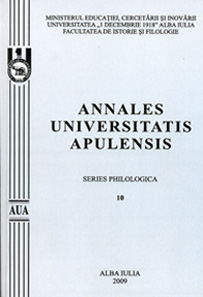L’APHORISME, LA MÉTAPHORE ET LA PARABOLE CHEZ ANTOINE DE SAINT –EXUPÉRY
THE APHORISM, THE METAPHOR AND THE PARABLE AT ANTOINE DE SAINT-EXUPERY
Author(s): Alexandru Lucian LucaSubject(s): Literary Texts
Published by: Universitatea »1 Decembrie 1918« Alba Iulia
Keywords: antagonisms; narrative discourse; poetic story; humanism; open world
Summary/Abstract: In as far as the style of Antoine de Saint-Exupery is concerned, an evolution from the narrative to the poetic is to be delineated. The narrative tendency is evident in the first writings, such as Vol de nuit, Terre des Hommes, with well-defined characters that evolve in clear units of time and space. The author, often carrying out the role of the narrator, explores the virtues of the narrative discourse, adding his own impressions about the narrated events, as a participant in the stories or as a receiver, in the process of narration. In his late writings instead, such as Le Petit Prince or Citadelle, the lyrical tendency becomes dominant. The real is intertwined with the miraculous and the result is an open world, filled with mystery and poetry in which fantasy is opposed to logic: “The essential is invisible to the eye. We can only see well with the heart”. Saint-Exupery is against the validity of the principle of non-contradiction. For instance, in Citadelle, the Berber prince, by encaging his people in love, finds it right to behead those who disobey him or refuse to follow him. Saint-Exupery willingly ignores the distinctions between good and evil, truth and falsehood, thinking and acting because he wants to absorb all the contradictions he meets and considers that the antagonisms of the principles are not obstacles but means that allow the artist to make a work full of life and ardor. Saint –Exupery uses figures of speech to construct his work, such as metaphors, aphorisms, parables, endowing his poetic story with a new dimension while feeling animated by the exigencies of his own time. His works are undoubtedly of topical interest, even if only from the perspective of the moral lessons of profound humanism included in Le Petit Prince.
Journal: Annales Universitatis Apulensis. Series Philologica
- Issue Year: 11/2010
- Issue No: 3
- Page Range: 268-278
- Page Count: 11
- Language: French

